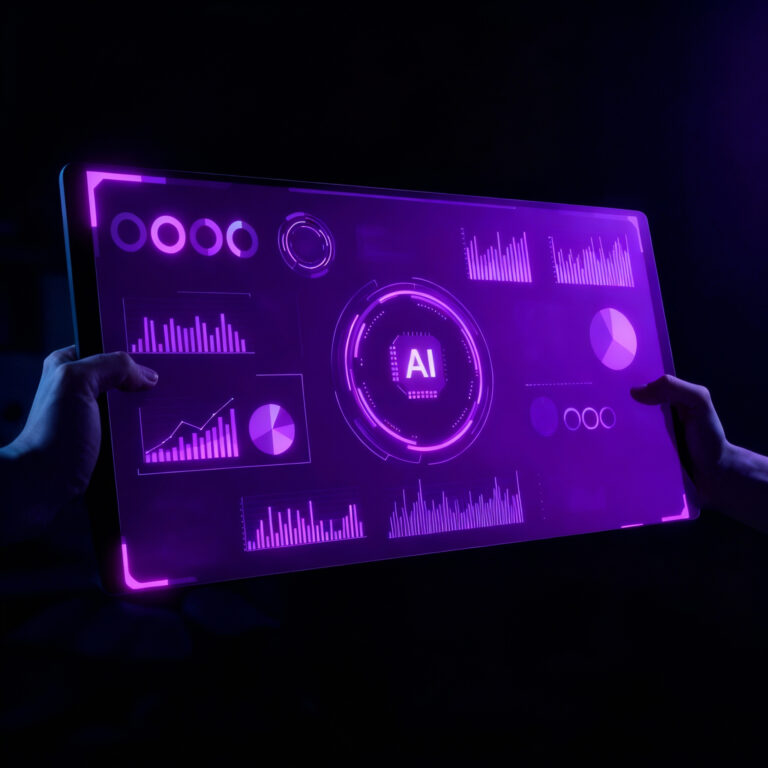Businesses traditionally have relied on tools to bring automation center stage. However, automation is not sufficient anymore! The keyword today is autonomous.
The capability of taking decisions independently is a desired feature for every business. The pace at which customers want services is dramatically shifting towards an ecosystem that could independently handle queries at large. However, handling customer queries is just a single aspect; other desired features that could win customers include delivering personalized services accurately.
This is where agentic AI comes into the picture.
But what exactly is agentic AI and how is it changing today’s business landscape? We are going to cover all this and a lot more in this bog post here starting with the basic definition of agentic AI.
What is agentic AI?
Agentic AI is a revolutionary shift in artificial intelligence where an advanced layer of autonomy governs smart decision-making. Unlike traditional AI, agentic AI doesn’t require constant human support. It works independently to achieve the desired outcome. Agentic AI senses, learns, and adapts through continuous feedback loops, helping businesses optimize processes for better decision making.
Agentic AI stands as the most prominent technology for businesses looking to improve their productivity and customer satisfaction while making their processes future ready.
What makes agentic AI different?
Agentic AI comes with an exceptional set of features ensuring a significant boost to business. These features include:
- Autonomy: While traditional AI is rule-based, agentic AI is autonomous, meaning it can act independently, making goal-oriented decisions without continuous human support.
- Context-awareness: Agentic AI understands the context of its surroundings to respond accordingly. It thus responds autonomously with relevant, goal-driven actions.
- Decision-making in real time: Agentic AI is capable of processing data instantly ensuring data-backed decisions in real time without any lag or delay.
Agentic AI benefits for businesses
Advanced execution capabilities
Agentic AI has advanced execution capabilities which makes it desired for businesses looking for autonomous authority in their processes.
The capabilities of AI include proactively managing complex IT infrastructures. The aim is to dynamically adjust supply chains and to engage in lifelike interactions with customers to resolve issues effectively.
The result?
A future defined by deeper workforce specialization, improved trust in information, and accelerated innovation.
Adapts pace as business demands
Agentic AI has inbuilt adaptability which ensures instant action when required. It is built to align with long-term business vision, ensuring constant business support.
For example, agentic AI in a retail environment might remember how a sudden spike in demand during a holiday weekend led to stockouts at several locations. Learning from that, it could now anticipate similar patterns, automatically adjusting inventory levels, and reallocating stock across stores. This proactive adaptability gives businesses the agility they need in unpredictable markets.
The result?
The result is an operation that can shift seamlessly while staying aligned with long-term goals and keeping pace with the speed of business.
Works in co-ordination with humans
Agentic AI is a subordinate at work, not a replacement for human resources. AI agents are emerging as independent assistance that trim down the work hours and ensure better efficiency for any given job.
For example, in customer service jobs, agentic AI can easily handle routine tasks and queries to offer end-to-end support with real-time insights. Real-time suggestions for complex tasks lead to faster and personalized solutions ensuring no overburdening for human agents.
The result?
By handling repetitive tasks, Agentic AI frees human agents to focus on high-value work that demands real-time decision-making.
Efficient, scales processes
Several tech stacks work at the back to make AI proactive and efficient even for complex business processes. This efficiency is also a result of techniques like periodic retraining that help the system get trained as per the queries and feedback it gets from different prompts.
For example- Systems like machine learning models are often retrained, and automation scripts only adapt when manually updated by developers. In contrast, Agentic AI continuously optimizes itself. It retains context from past interactions and adapts in real time — fine-tuning its algorithms dynamically, without waiting for scheduled updates or human intervention.
The result?
Business processes will get smarter over time without being manually trained, ensuring optimized operations.
Workflow automation
Agentic AI is a decision-maker even for complex processes like managing a supply chain. Unlike traditional AI, that would require constant manual input. Agentic AI learns and adapts to fulfill requirements.
Agentic AI constantly rethinks and evaluates strategy whenever needed. For example, if there is a sudden supply chain disruption, agentic AI can take a holistic approach to autonomously relocate resources ensuring alternative supplies while notifying stakeholders about the new delivery timelines – all this in real time.
The result?
With each disruption, agentic AI learns and improves its scope for future responses. This takes traditional AI’s basic automation to intelligent adaptive operations.
Scalable agentic AI solutions for every industry
Post call analysis
Agentic AI’s innovative capability includes post-call analysis. This data-backed analysis extracts meaningful insights — including sentiment, intent, resolution outcomes, and agent effectiveness from a call. Unlike traditional tools, it understands context, identifies behavioral patterns, and suggests the next best actions.
With every conversation, it learns and adapts, enhancing future interactions, guiding agent coaching, offering insights to agent performance, and streamlining operations — transforming each call into a source of actionable intelligence.
Chat agents as first line of interaction with business
AI-powered chat agents now serve as the first line of interaction to engage customers, and handle initial inquiries, routing requests, and delivering instant support.
By providing quick, consistent, and intelligent responses, AI-powered chat agents enhance user experience, reduce response times, and filter complex cases to human agents only when needed. This streamlines customer journeys and ensures every interaction starts with efficiency and precision.
Call agents for quick query resolve
Call agents play a critical role in delivering fast, personalized support when customers need answers quickly. Whether it’s resolving billing issues, clarifying product details, or guiding users through troubleshooting steps, call agents provide real-time assistance that builds trust and satisfaction.
Equipped with real-time data and contextual suggestions, call agents can minimize wait times and ensure that even complex issues are addressed in a single interaction. This not only improves customer experience but also boosts operational efficiency.
The bottom line
Running a business is more than just managing the resources here and there. It requires managing an entire ecosystem where impactful decisions can make all the difference.
The evolution of agentic AI services is ensuring a shift in businesses where operations are managed on-the-go, clients are served instantly, and their feedback helps agentic AI learn and adapt quickly for a more dynamic solution.
This business transformation is not just technical but a lot more strategic, which brings a critical question for leaders today – if they want to consider the shift toward agentic AI, or race to catch up once it becomes the norm.
Embracing this next evolution in AI-driven automation demands strategic foresight: from identifying high-impact use cases to ensuring data infrastructure is ready to support intelligent, adaptive systems.





